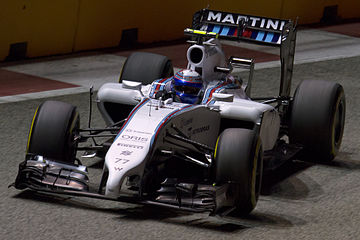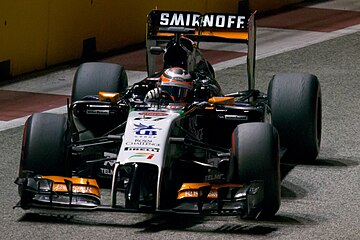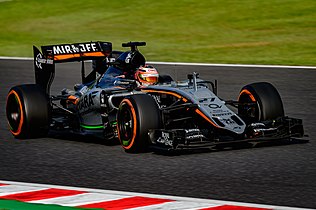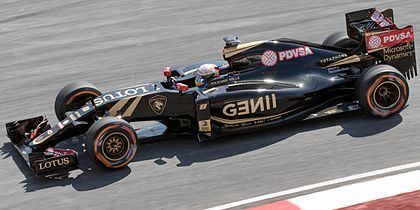Mercedes PU106-Type Hybrid
| Mercedes PU106A/B/C Hybrid | |
|---|---|
| Overview | |
| Manufacturer | |
| Production | 2014–present |
| Layout | |
| Configuration | V6 engine (90°), limited to 15,000 RPM in a mid-mounted, rear-wheel drive layout |
| Displacement | 1,600 cc (1.6 L; 97.6 cu in) |
| Cylinder bore | 80 mm (3 in) |
| Piston stroke | 53 mm (2 in) |
| Block material | Aluminum Alloy |
| Head material | Aluminum Alloy |
| Valvetrain | 24-valve, DOHC, four-valves per cylinder |
| Combustion | |
| Turbocharger | Mercedes AMG-HPP |
| Fuel system | ATL Kevlar-reinforced rubber bladder Bosch high-pressure direct injection (max 500 bar, one injector/cylinder) |
| Management | McLaren Electronic Systems (including chassis control, engine control, data acquisition, alternator, sensors, data analysis and telemetry) |
| Fuel type | 102 RON unleaded gasoline (94.25%) + Biofuel (5.75%)
|
| Cooling system | Water-cooled |
| Output | |
| Power output | 750–850 horsepower (560–630 kW) @ 15,000 RPM depending on Motor Generator Unit–Kinetic (MGU-K) |
| Torque output | ~ 495 N⋅m (365 ft⋅lbf) @ 11,500 RPM |
| Dimensions | |
| Dry weight | 145 kg (320 lb) FIA-mandated including MGU-K, MGU-H, turbocharger, exhaust manifold, filter, clutch, lubricant tank and battery storage |
| Chronology | |
| Predecessor | Mercedes-Benz FO 108F 2.4L V8 (2013) |
The Mercedes PU106-Type(A/B/C) Hybrid is a power unit which include a 1.6-litre single-turbocharged V6 engine, developed and produced by Mercedes AMG High Performance Powertrains for Formula One teams.
Unique Feature[edit]
Sky Sports F1 reported that an innovative design feature – compressor and turbo were packaged at opposite ends of the internal combustion engine on the Mercedes PU106-Type Hybrid, which gave them the edge in packaging, aerodynamic efficiency, and battery usage.[1]
Power Unit Perimeter[edit]
Internal Combustion Engine (ICE)[edit]
The Internal Combustion Engine (ICE) is the traditional, fuel-powered heart of the Power Unit; previously known simply as the engine. The engine will be a 1,600 cc (1.6 L; 97.6 cu in), V6 turbocharged engine configuration, with direct fuel injection up to 500 bar of pressure. It will be limited to 15,000 rpm. This reduction in crankshaft rotational speed coupled with the reduction in engine capacity and number of cylinders, reduces the friction and thus increases the total efficiency of the Power Unit. This down-speeding, down-sizing approach is the key technological change at the heart of the ICE structure.
Motor Generator Unit - Kinetic (MGU-K)[edit]
The Motor Generator Unit-Kinetic (MGU-K) has double the power capability of the previously used KERS motors and operates in an identical way. Some of the kinetic energy that would normally be dissipated by the rear brakes under braking is converted into electrical energy and stored in the Energy Store. Then, when the car accelerates, energy stored in the Energy Store is delivered to the MGU-K which provides an additional boost up to a maximum power of 120 kW (~ 160 hp) to the rear axle for over 30 seconds per lap.
Motor Generator Unit - Heat (MGU-H)[edit]
The Motor Generator Unit-Heat (MGU-H) is a new electrical machine that is directly coupled to the turbocharger shaft. Waste exhaust energy that is in excess of that required to drive the compressor can be recovered by the turbine, harvested by the MGU-H, converted into electrical energy and stored in the Energy Store. Where the MGU-K is limited to recovering 2 MJ of energy per lap, there is no limit placed on the MGU-H. This recovered energy can be used to power the MGU-K when accelerating, or can be used to power the MGU-H in order to accelerate the turbocharger, thus helping to eliminate ‘turbo lag’. This new technology increases the efficiency of the Power Unit and most significantly provides a method to ensure good drive-ability from a boosted, down-sized engine.
Energy Store (ES)[edit]
The Energy Store (ES) does exactly what it says; storing the energy harvested from the two Motor Generator Units (MGUs) for deployment back into those same systems. It is capped in terms of maximum and minimum weight: the maximum at 25 kg, while the minimum will be 20 kg.
Turbocharger (TC)[edit]
The turbocharger is an energy recovery device that uses waste exhaust energy to drive a single stage exhaust turbine that in turn drives a single stage compressor via a shaft, thereby increasing the pressure of the inlet charge (the air admitted to the engine for combustion). The increased pressure of the inlet charge offsets the reductions in engine capacity and RPM when compared to the V8, thus enabling high power delivery from a down-sized engine. The turbocharger is the key system for increasing the efficiency of the ICE.
Control Electronics (CE)[edit]
FIA standard Electronic Control Unit (ECU) and FIA homologated McLaren Electronic Systems (MES).
Energy Recovery System[edit]
- Motor Generator Unit - Kinetic (MGU-K)
- Motor Generator Unit - Heat (MGU-H)
- Energy Store (ES)
Mercedes PU106A Hybrid (2014 Generation)[edit]
In the nineteen Grands Prix of the 2014 season, the Mercedes PU106A Hybrid secured sixteen wins, forty-two podiums, nineteen poles, fifteen fastest laps, fourteen front row lockouts, fifteen 1–2 finishes and a total of 1357 points out of 2020 points.
Applications[edit]
| Entrant | Constructor | Chassis | Results | |||||
|---|---|---|---|---|---|---|---|---|
| Wins | Podiums | Pole position | Fastest lap | Points | WCC Position | |||
| Mercedes AMG Petronas Formula One Team | Mercedes | Mercedes F1 W05 Hybrid | 16 | 31 | 18 | 12 | 701 | 1st |
| Williams Martini Racing | Williams-Mercedes | Williams FW36 | 0 | 9 | 1 | 2 | 320 | 3rd |
| McLaren Mercedes | McLaren-Mercedes | McLaren MP4-29 | 0 | 2 | 0 | 0 | 181 | 5th |
| Sahara Force India F1 Team | Force India-Mercedes | Force India VJM07 | 0 | 1 | 0 | 1 | 155 | 6th |
Applications Gallery[edit]
- Applications Gallery
-
Mercedes F1 W05 Hybrid, driven by Lewis Hamilton, during the 2014 Singapore Grand Prix
-
Williams FW36, driven by Valtteri Bottas, during the 2014 Singapore Grand Prix
-
McLaren MP4-29, driven by Jenson Button, during the 2014 Chinese Grand Prix
-
Force India VJM07, driven by Nico Hülkenberg, during the 2014 Singapore Grand Prix
Awards[edit]
Mercedes PU106B Hybrid (2015 Generation)[edit]
In the nineteen Grands Prix of the 2015 season, the Mercedes PU106B Hybrid secured sixteen wins, thirty-eight podiums, eighteen poles, thirteen fastest laps, fifteen front row lockouts, twelve 1–2 finishes and a total of 1174 points out of 1919 points.
Applications[edit]
| Entrant | Constructor | Chassis | Results | |||||
|---|---|---|---|---|---|---|---|---|
| Wins | Podiums | Pole position | Fastest lap | Points | WCC Position | |||
| Mercedes AMG Petronas Formula One Team | Mercedes | Mercedes F1 W06 Hybrid | 16 | 32 | 18 | 13 | 703 | 1st |
| Williams Martini Racing | Williams-Mercedes | Williams FW37 | 0 | 4 | 0 | 0 | 257 | 3rd |
| Sahara Force India F1 Team | Force India-Mercedes | Force India VJM08 | 0 | 1 | 0 | 0 | 136 | 5th |
| Lotus F1 Team | Lotus-Mercedes | Lotus E23 Hybrid | 0 | 1 | 0 | 0 | 78 | 6th |
Applications Gallery[edit]
- Applications Gallery
-
Mercedes F1 W06 Hybrid, driven by Nico Rosberg, during the 2015 Malaysian Grand Prix
-
Williams FW37, driven by Felipe Massa, during the 2015 Malaysian Grand Prix
-
Force India VJM08, driven by Nico Hülkenberg, during the 2015 Japanese Grand Prix
-
Lotus E23 Hybrid, driven by Romain Grosjean, during the 2015 Malaysian Grand Prix
Awards[edit]
Mercedes PU106C Hybrid (2016 Generation)[edit]
Applications[edit]
| Entrant | Constructor | Chassis | Results* | |||||
|---|---|---|---|---|---|---|---|---|
| Wins | Podiums | Pole position | Fastest lap | Points | WCC Position | |||
| Mercedes AMG Petronas Formula One Team | Mercedes | Mercedes F1 W07 Hybrid | 1 | 2 | 1 | 0 | 43 | 1st |
| Williams Martini Racing | Williams-Mercedes | Williams FW38 | 0 | 0 | 0 | 0 | 14 | 3rd |
| Sahara Force India F1 Team | Force India-Mercedes | Force India VJM09 | 0 | 0 | 0 | 0 | 6 | 6th |
| Manor Racing MRT | MRT-Mercedes | Manor MRT05 | 0 | 0 | 0 | 0 | 0 | 11th |
* Season still in progress.
References[edit]
- ↑ "How Mercedes' packaging of their turbo engine has given them the edge". Sky Sports. BSkyB. 6 April 2014. Retrieved 7 April 2014.Illustrated comparison
External links[edit]
- Mercedes AMG Petronas Formula One Team
- Mercedes AMG High Performance Powertrains
- Fédération Internationale de l'Automobile (FIA)
This article "Mercedes PU106-Type Hybrid" is from Wikipedia. The list of its authors can be seen in its historical. Articles copied from Draft Namespace on Wikipedia could be seen on the Draft Namespace of Wikipedia and not main one.








